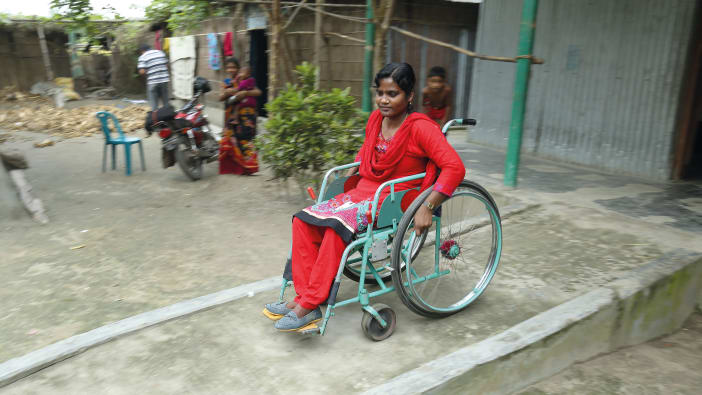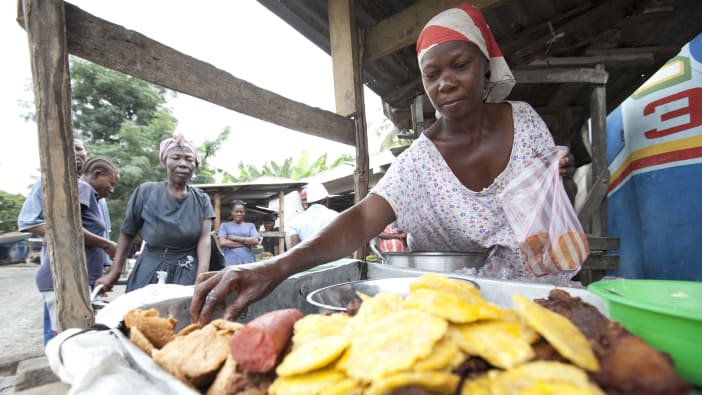by Michael Duggan and Paul Draper.
Like many remote places in the world, the island of Rodrigues, 350 miles NE of Mauritius in the Indian Ocean, has a number of poor people with disabilities. The island is only eight miles by four miles in size with a rapidly growing population and few opportunities for work. People with disabilities had no hope of finding work with 90% unemployment on the island.
However the island has a good climate, varied vegetation and a good hardworking bee (Apis mellifera). In the past beekeeping was very popular and a lot of honey was produced. However, during the 1990s beekeeping declined like all other forms of agriculture. Beekeepers became discouraged; there was no leadership, no sharing of information and poor management.
Craft Aid, a local Mauritian organisation, set up a branch in Rodrigues in 1989. They started in a small way making cards and crafts. They quickly found many deaf or partially deaf children, destined for an unproductive life at home. They started a small school for them, which soon expanded to include partially sighted children as well. Their workshops grew and with them employment opportunities for people with disabilities. However, ideas were needed for new sources of income to enable the children to continue working when they left the school.
They decided to start processing honey and began looking for funding and expertise. A year later a beekeeper arrived, with experience of producing practical aids and tools for people with disabilities. With his advice, a processing department was established where people with disabilities could process and bottle honey. This would also be a centre that shared information and provided good quality beekeeping supplies for beekeepers on the island. Beekeepers would be paid immediately they brought their honey instead of perhaps waiting a year.
Problems
Various problems had to be overcome. There were many bee predators including chameleons, lizards, ants and termites. In addition, the island has to cope with extreme winds most years from November to March as it is in the cyclone belt. There were also problems with processing the honey, including dirt, poor packaging and fermentation. If honey crystallised, local people believed this meant the beekeeper had put sugar in the honey.
Solutions were eventually found for all these problems but the island also has communication problems, so a plan was made to share information about good beekeeping practices.
Training
In the past our centre was criticised for not helping isolated people with disabilities, living far from roads. So we started a scheme to train these people at our centre in basic beekeeping. We set up a training centre with 12 hives, all made to modern designs and high standards and built in the Craft Aid workshops. The aims were to:
- learn good beekeeping practices
- provide courses for disabled beekeepers or their dependents
- provide income to pay the wages of those employed in processing honey.
If the person with disabilities was unable to do the training course, we would train a member of their family who would then be responsible for involving them in the beekeeping. The whole family then benefited from the sale of the honey. Six monthly courses are run not just for people with disabilities and their families but for others as well. At the end of each course each trainee is provided with a hive and colony of bees as long as they have prepared a proper fenced site at their home including a metal base (to prevent predators) and a water basin. They receive a loan to buy the necessary equipment which is gradually paid back out of the sale of honey. ‘Outsiders’ pay in full for the training and all their equipment and bees.
About 45 students have now attended the courses with most taking up the challenge to start beekeeping. The trainees and their families really benefit from the income raised, which can be quite substantial. They do not need to travel as we collect the honey frames and do the extracting, bottling and marketing for them. We encourage them to invest in equipment and supplies if they want to continue and grow.
Different abilities
Beekeeping can be usefully carried out by people with different abilities. As with almost all our work in Craft Aid, in order to be productive and competitive, we work in groups of people both with and without disabilities. This works well and they learn a lot from each other. Different operations can often be shared with other family members. For example, blind people can participate in activities such as frame cleaning and maintenance. People with hearing difficulties can usually work well with those with physical difficulties. People with learning disabilities can also help in many of the operations, working with someone without disabilities. Each person or group finds their own way of working. There are no set methods or rules.
Quality control
We now have nine people working full time in the honey bottling plant. We buy honey from 25 beekeepers on the island, of which 20 have people with disabilities within the family. Some have up to 60 hives, some have only one hive at present. All the honey we process has established standards of quality and packaging. Craft Aid have no difficulty in selling this honey. The income pays for our staff costs.
Sharing skills
The transfer of information continues. Help or advice is freely given. Beekeepers can buy good quality equipment and supplies from us, with the added benefit of a Master Beekeeper who visits once a year from the UK to advise and encourage in good beekeeping techniques.
However the response by the island’s traditional beekeepers has been disappointing. They still use rum bottles, over-heat the honey and use dirty equipment.
The future
The entire project has so far proved very successful. It encourages high standards of beekeeping, better honey production of high quality honey, gives confidence to people with disabilities, encourages poor families often in desperate situations, but above all, produces income.
A young beekeeper can earn an equivalent of two months’ wages with the honey produced in the first year.
Several major threats remain; firstly what happens when the next cyclone hits the island? The hives can be tied down, but where will the bees feed if all the trees have been damaged?
The high quality of our honey means there is a good local market, particularly among the tourists, but new markets will be needed as honey production increases.
Finally, Rodrigues’ bees seem free of diseases at present. If disease, particularly Varroa is introduced, it will be devastating for the island and its economy.
Paul Draper has been Director of Craft Aid since 1982. Michael Duggan has many years of experience as a Master Beekeeper. They can be contacted through Craft Aid, Camp du Roi, Rodrigues Island, Republic of Mauritius, Indian Ocean.
Tel: 230 8311766, Fax: 230 8312276
E-mail: [email protected]
Useful information
More details on beekeeping and hive design can be obtained from Bees for Development, Troy, Monmouth, NP5 4AB, UK. Tel: +44 (0)16007 13648 Fax: +44 (0)16007 16167
E-mail: [email protected]








